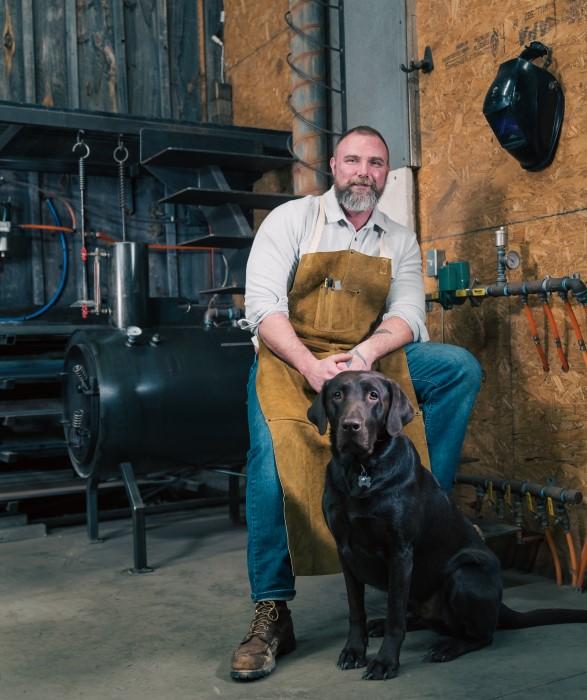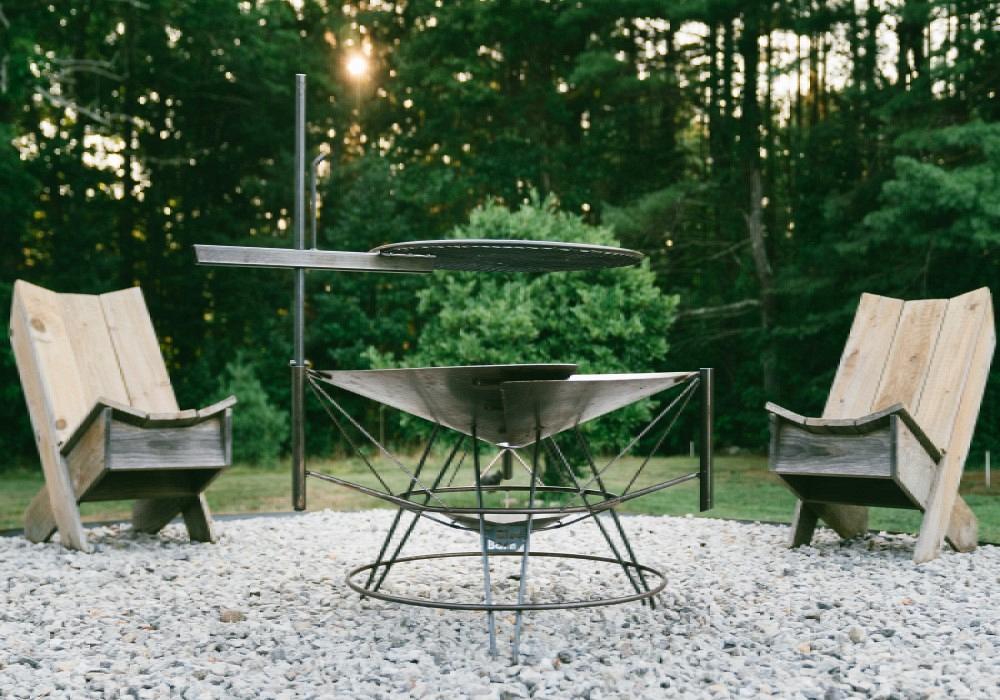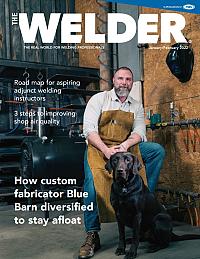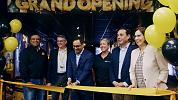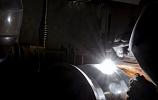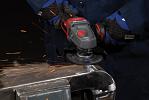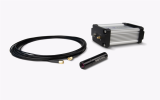- FMA
- The Fabricator
- FABTECH
- Canadian Metalworking
Categories
- Additive Manufacturing
- Aluminum Welding
- Arc Welding
- Assembly and Joining
- Automation and Robotics
- Bending and Forming
- Consumables
- Cutting and Weld Prep
- Electric Vehicles
- En Español
- Finishing
- Hydroforming
- Laser Cutting
- Laser Welding
- Machining
- Manufacturing Software
- Materials Handling
- Metals/Materials
- Oxyfuel Cutting
- Plasma Cutting
- Power Tools
- Punching and Other Holemaking
- Roll Forming
- Safety
- Sawing
- Shearing
- Shop Management
- Testing and Measuring
- Tube and Pipe Fabrication
- Tube and Pipe Production
- Waterjet Cutting
Industry Directory
Webcasts
Podcasts
FAB 40
Advertise
Subscribe
Account Login
Search
From violinmaker to welder: Blue Barn brings a personal flair to fabrication
Massachusetts metal fabricator switches gears, finds fulfillment in building small business
- By Amanda Carlson
- February 2, 2022
- Article
- Arc Welding
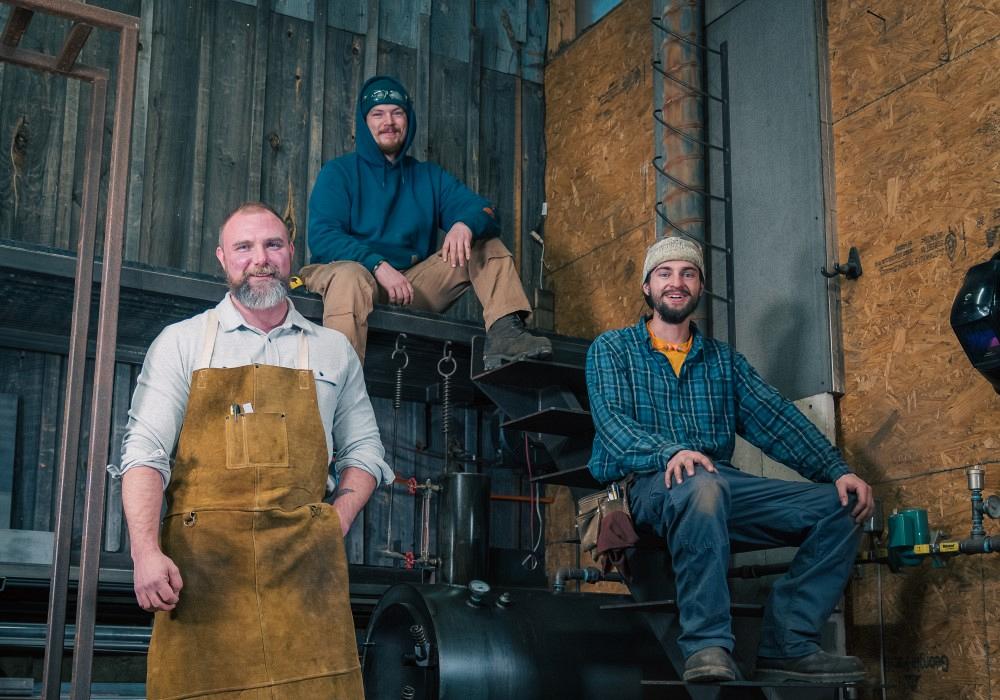
Since opening Gardner, Mass.-based Blue Barn eight years ago, Jason Hoynash (left) has been on a roller coaster ride of finding his niche, hiring individuals who can hang but who also love the work, opening a retail business, and navigating through a pandemic. He is pictured with Duncan Nix (right) and Tom Williams (top).
Fabricators have an amazing ability to adjust when the situation requires.
An example is Jason Hoynash, who spent 13 years as a violinmaker before going into business for himself full time as a custom fabricator focusing mostly on commercial projects.
Metal fabrication and design gave him what violinmaking couldn’t: a license for creativity and a reprieve from the repetitive while still allowing him to work with his hands.
Since opening Gardner, Mass.-based Blue Barn eight years ago, Hoynash has been on a roller coaster ride of finding where his niche lies, finding individuals with skill who can hang and who also love the work, opening an offshoot retail business, and navigating through a pandemic when he had to act quickly to make adjustments not just for himself and his family, but for his employees as well.
Hoynash’s intelligence, diversity of skills, and quick thinking have been the main reasons he’s been able to keep his business afloat during the last two years. He’s gained enough perspective as a business owner to know what helps his company (being proactive) and what doesn’t (worrying and losing sleep). He’s excited to spend more time developing Blue Barn Outdoor Living, a retail arm of the company the specializes in outdoor UFO fire pits.
Doing creatively challenging yet gratifying work has made every day fun and unique. However, starting a fabricating business in the blue barn just steps away from the home he shares with his wife and daughter has added a layer of fulfillment to the whole experience.
How did you go from making violins to becoming a designer and fabricator for commercial and residential projects?
I had a couple friends in the restaurant industry, one of whom had come up with a concept for a restaurant that was open-fire cooking. Over a couple of beers he asked me if I would be willing to design and build the grill and oven, which would be kind of the centerpiece for the restaurant. Naively I said yes, even though I didn’t know what I was doing. I created designs, fabricated the grill and the oven, and they came out really well -- and this was before the restaurant was finished.
The ownership group decided they didn't like their interior designer so they offered me the job to design the whole interior of the restaurant and build it out. So, I did, and I was doing that in addition to my full-time violin gig. It was exhausting, but it was so creatively gratifying. To have someone put their faith in you to design and execute this, which is basically their dream; it turned out to be one of the most satisfying experiences I ever had. While I was doing that, I got an offer to do some fabrication for another restaurant in town. And at that point, I knew I had to shit or, frankly, get off the pot.
I quit the violin gig and I went into business as a fabricator full time. For a while I did it on my own but got to a point where I was busy enough that I had to hire someone. I knew I didn't want someone who was set in their ways. I really like the idea of technical schools, and I think that more kids should go to them.
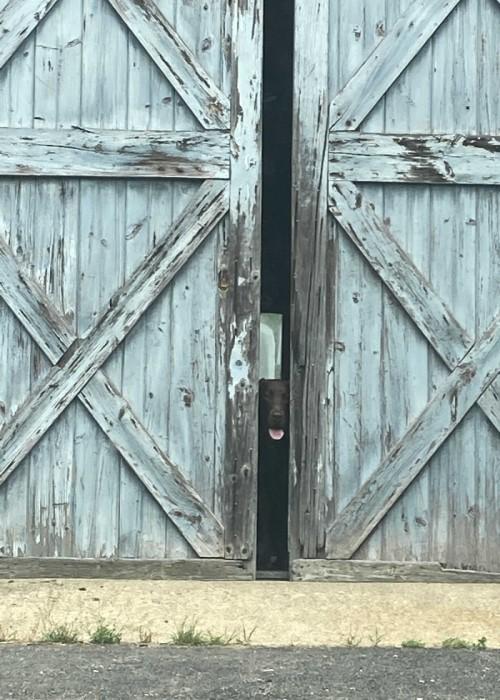
Having his shop—a literal blue barn—steps away from his front door allows for a few comforts of home, including the company of shop dog Bob Barker.
I went to the local tech school and became friends with the teachers and hired a kid on co-op. And he still works for me today. That was nine years ago.
Now I've got two full-timers in the shop and they both came right out of tech school. We're just cranking right now. We're busy.
We still do a lot of restaurant work, but we've recently branched out into residential work as a result of COVID-19. There's a fair amount of pretty cool progressive, modern architectural projects going on out here. We got into making a few of these center-stringer staircases and railings. And then we developed a window system that we build out of steel. We did a lot of window and stair projects. Right now our business is about 40% residential and about 60% commercial.
Did the idea behind founding Blue Barn Outdoor Living start from that original restaurant job?
It was kind of a tangent, yes. The idea was rooted in an effort to create a product instead of operating a service business. I love cooking outside on open fire.
My friends and I like to do a lot of cooking out. We'll take the four-wheelers or just hike out into the woods and cook meals. That kind of brought up the need for a simple grill system that can be transported easily. I came up with the idea, which is nothing new, of using a pin that goes into the ground and cantilevering the grill off the pin. A client saw it and said they needed something like it for a catering gig, but couldn’t build a fire on the ground. So I prototyped the first UFO grill for this guy. He catered an event for 200 people with it and loved it. That’s when I thought this thing might have legs.
It was basically a COVID project. We were slow because of the pandemic and I needed something for the boys in the shop to do. We made all of the machinery to actually produce the parts. We made a 10-ton hydraulic press that was specifically designed to make the dish, and a roll bender designed to make the rings. I haven't really invested any time in marketing, but that’s the next step.
How do you find good employees, and what qualities make for the ideal employee for your business?
As far as qualities go, malleability is a big one for me. Not being set in your ways and being flexible and willing to take on a work process that you're unfamiliar with. Most of the things we make have never been made before. Every job is new, so you have to be kind of intellectually flexible and into it to work here, frankly.
The work doesn't really get stale. One day we're trying to bend tube to 1/1,000-in. accuracy; the next day we're machining parts to the same tolerances; and the day after that we could be fabricating I-beam structures to go on a roof deck in Boston, and it's only got to be good to 1/8 in.
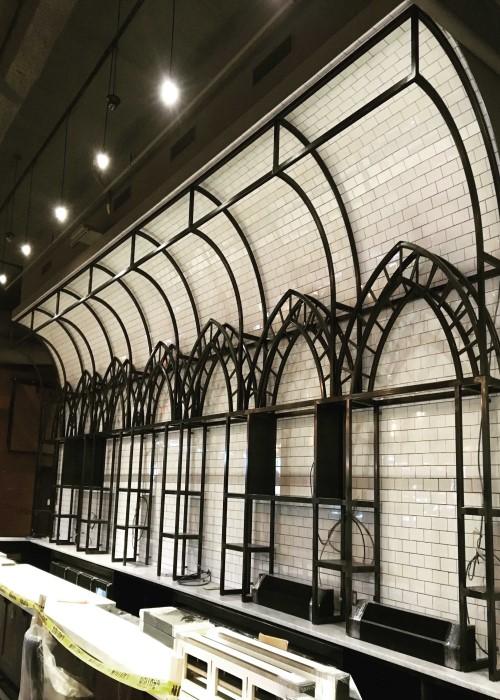
Hoynash’s life changed when he was asked to design and build out all the interior components for a new restaurant. That project introduced him to work that was both creatively challenging and diverse. From that moment, he was hooked.
I like hiring young people because they're not jaded yet. Most times their interest in the job isn't just monetary, they actually have passion for what they do. So do I, and I like to share that with them. And there's plenty of people who have been in the industry for so long that they're just jaded and they're just in it for a paycheck, and that's not me, and that's not what this business is about for me. It's not just about satisfying the client either, although that's incredibly important. It’s going through the creative process and making something that you're proud of.
How have you had to navigate through the challenges that COVID-19 presented?
Frankly, what transpired after the COVID shutdowns was a big moment for us. At the time we had several contracts lined up, but when the shutdown happened, these general contractors contacted me and said everything was on hold indefinitely. We were absolutely counting on these jobs.
At the time I thought COVID would blow over pretty quickly and that I wouldn’t need to mobilize too much. I thought the best thing we could do was get a couple of filler jobs to keep everyone busy. I have a fair number of friends in the residential building and contracting world, and I called them and asked if they had any work for us. I put the feelers out there and called everyone. We got some residential jobs going and, like anyone who was in that business at the time, it really took off.
People were stuck at home and realized that they didn’t like certain aspects about their house. People in the business world still had money coming in and then there was money from the government, and many people chose to invest that money into their properties. It worked out really well for us.
What is a current challenge your business faces that keeps you up at night?
I don’t tend to lose much sleep anymore because I’ve realized those things don’t help the problem. But there are two things that I do think about. The first is where the next job will come from. We've been fortunate to have more work than we know what to do with these days, and I think that's because we pay really close attention to quality and accuracy, and we really try to deliver a product that is so tight and correct that the client's happy every time. I'm not really stressing about where the work will come from these days, but I was at the beginning of COVID.
The other big challenge is that we are a contractor, which basically means we have to do the work and put up the product and the labor and the hours upfront and then wait to get paid. The whole structure of the contracting world is really problematic in that regard, right? I mean, we'll get a deposit upfront for the materials, but once the job is done, we can wait between 60 and 90 days for the final invoice to be paid. And that's the thing that's really stressful because it's out of your hands. You've already done the work, they're happy with the work, but the check just hasn't arrived yet. And there's only so much pressure you can afford legally to put on a client, not to mention the fact that you don't want to alienate them in case they want to do more work with you.It's this very fine balance of not pissing people off and getting paid on time. And that was one of the other impetuses for starting Blue Barn Outdoor Living. The retail dynamic versus the contracting dynamic is just very different.How else has the pandemic changed your business? Have you had to purchase more equipment? Have you had to invest in automation at all?
Our stuff is so specialized that we can't really automate because we're never doing batches of, say, more than 100 parts. We definitely have expanded the capabilities of the shop. We have spent a lot of time making the equipment that we use instead of purchasing it. I’ve looked up what it would cost to buy a piece of equipment and realized that I can make it for less money and with more capabilities than what I can buy. For instance, recently we made a roll forming machine, and I was able to make it for about $6,000. To purchase one with the same capabilities would cost me $20,000.
What makes Blue Barn different from other small businesses?
We have a shop dog; his name's Bob Barker. He’s my favorite animal on the planet. He’s a chocolate lab and he's actually lying right here. I think having him and having the shop attached to where my wife and I live makes it very personal. Our business, I think, is more personal than many. We are a family-based business. Frequently we’ll have the boys in for dinner or we'll have some beers together after work outside. I love it.
My daughter comes out in the shop and we’ll set her up so she can cut things out on the band saw and she’s learning to weld right now. She's 10, and I think that's a really cool thing to be able to share with her and for her to be able to grow up with. She is learning that she can make anything that she wants. She doesn't have to go buy it. If she wants something, she can design it, make it, and it'll probably be better than what she could go out and buy.
About the Author

Amanda Carlson
2135 Point Blvd
Elgin, IL 60123
815-227-8260
Amanda Carlson was named as the editor for The WELDER in January 2017. She is responsible for coordinating and writing or editing all of the magazine’s editorial content. Before joining The WELDER, Amanda was a news editor for two years, coordinating and editing all product and industry news items for several publications and thefabricator.com.
About the Publication
subscribe now
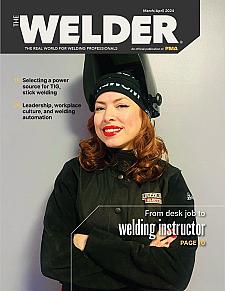
The Welder, formerly known as Practical Welding Today, is a showcase of the real people who make the products we use and work with every day. This magazine has served the welding community in North America well for more than 20 years.
start your free subscription- Stay connected from anywhere

Easily access valuable industry resources now with full access to the digital edition of The Fabricator.

Easily access valuable industry resources now with full access to the digital edition of The Welder.

Easily access valuable industry resources now with full access to the digital edition of The Tube and Pipe Journal.
- Podcasting
- Podcast:
- The Fabricator Podcast
- Published:
- 04/16/2024
- Running Time:
- 63:29
In this episode of The Fabricator Podcast, Caleb Chamberlain, co-founder and CEO of OSH Cut, discusses his company’s...
- Industry Events
16th Annual Safety Conference
- April 30 - May 1, 2024
- Elgin,
Pipe and Tube Conference
- May 21 - 22, 2024
- Omaha, NE
World-Class Roll Forming Workshop
- June 5 - 6, 2024
- Louisville, KY
Advanced Laser Application Workshop
- June 25 - 27, 2024
- Novi, MI
























